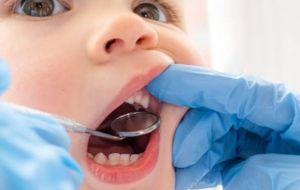MercoPress. South Atlantic News Agency
UNICEF report on hardships facing Argentine households released
 The UNICEF survey noted a reduction in households unable to seek dental treatments
The UNICEF survey noted a reduction in households unable to seek dental treatments Three out of every ten households with children and adolescents in Argentina are unable to cover their monthly expenses, according to the ninth “Rapid Survey” conducted by the United Nations Children's Fund (UNICEF) in August released this week.
The survey highlights significant financial strain on Argentine families, coupled with new warnings regarding adolescent well-being, including a sharp rise in school bullying and growing participation in online betting.
The report indicates that 31% of households with children and adolescents have monthly incomes insufficient to cover their current expenses. While this figure represents a recovery from last year's 48%, the underlying economic challenges persist.
UNICEF Representative in Argentina Rafael Ramírez Mesec stated that these results “show fragile progress based on the reduction of poverty, but also challenges that must be addressed as a priority on the public agenda to consolidate and accelerate that trend.”
Household indebtedness is identified as a major concern, increasing by eight percentage points over the last year to reach 31% (including debts with banks, credit cards, or state agencies like ANSES pensions bureau). Informal loans and digital wallet debts included, family indebtedness rises to 45%.
Among middle-class sectors, four out of ten households had to stop paying a service, and 16% reported difficulties paying credit card debts. Furthermore, one in ten households had to cancel their private healthcare coverage or change their children's school due to economic reasons.
Non-payment of court-ordered child support continues to affect more than half (52%) of mothers who are due to receive it, a figure that has remained unchanged over the years.
The prevalence of school bullying has seen a significant increase, rising from 25% to 41%, affecting an estimated one million children.
Additionally, teenage involvement in online gambling affectef four out of ten adolescents.
UNICEF emphasized that this data calls for strengthening prevention policies and support for mental health and school coexistence.
Despite these challenges, the survey did note some positive developments, including an 8-point decrease in the proportion of households unable to access a doctor or dentist due to a lack of resources.
Food consumption also showed a recovery, with a reduction from 52% to 30% in households reporting a need to restrict meals due to insufficient funds.




Top Comments
Disclaimer & comment rulesCommenting for this story is now closed.
If you have a Facebook account, become a fan and comment on our Facebook Page!